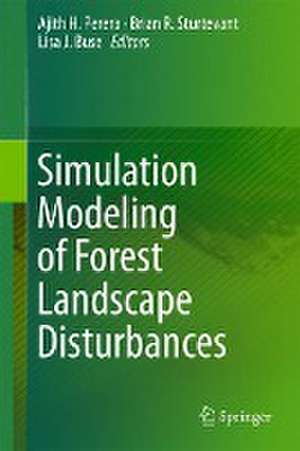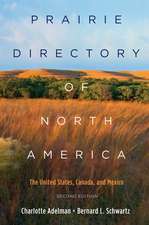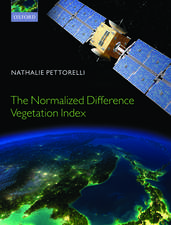Simulation Modeling of Forest Landscape Disturbances
Editat de Ajith H. Perera, Brian R. Sturtevant, Lisa J. Buseen Limba Engleză Hardback – 7 aug 2015
| Toate formatele și edițiile | Preț | Express |
|---|---|---|
| Paperback (1) | 631.37 lei 6-8 săpt. | |
| Springer International Publishing – 22 oct 2016 | 631.37 lei 6-8 săpt. | |
| Hardback (1) | 637.51 lei 6-8 săpt. | |
| Springer International Publishing – 7 aug 2015 | 637.51 lei 6-8 săpt. |
Preț: 637.51 lei
Preț vechi: 750.00 lei
-15% Nou
Puncte Express: 956
Preț estimativ în valută:
122.04€ • 125.51$ • 101.25£
122.04€ • 125.51$ • 101.25£
Carte tipărită la comandă
Livrare economică 19 februarie-05 martie
Preluare comenzi: 021 569.72.76
Specificații
ISBN-13: 9783319198088
ISBN-10: 3319198084
Pagini: 321
Ilustrații: X, 321 p. 74 illus., 51 illus. in color.
Dimensiuni: 155 x 235 x 25 mm
Greutate: 0.64 kg
Ediția:1st ed. 2015
Editura: Springer International Publishing
Colecția Springer
Locul publicării:Cham, Switzerland
ISBN-10: 3319198084
Pagini: 321
Ilustrații: X, 321 p. 74 illus., 51 illus. in color.
Dimensiuni: 155 x 235 x 25 mm
Greutate: 0.64 kg
Ediția:1st ed. 2015
Editura: Springer International Publishing
Colecția Springer
Locul publicării:Cham, Switzerland
Public țintă
ResearchCuprins
Simulation modeling of forest landscape disturbances: An overview.- Modeling windthrow at stand and landscape scales.- Approaches to modeling landscape-scale drought-induced forest mortality.- Modeling wildfire regimes in forest landscapes: Abstracting a complex reality.- Modeling insect disturbance across forested landscapes: Insights from the spruce budworm.- Individual-based modeling: Mountain pine beetle seasonal biology in response to climate.- Southern pine beetle herbivory in the southern United States: Moving from external disturbance to internal process.- Exploring interactions among multiple disturbance agents in forest landscapes: Simulating effects of fire, beetles, and disease under climate change.- Simulating forest landscape disturbances as coupled human and natural systems.- Simulating forest recovery following disturbances: Vegetation dynamics and biogeochemistry.- Simulation modeling of forest landscape disturbances: Where do we go from here?.
Notă biografică
Ajith H. Perera
Ontario Forest Research Institute
Ontario Ministry of Natural Resources
1235 Queen St. E., Sault Ste. Marie, ON P6A 2E5 Canada
ajith.perera@ontario.ca
Brian R. Sturtevant
Institute for Applied Ecosystem Studies, Northern Research Station, USDA Forest Service,
5985 Hwy K, Rhinelander, WI 54501 USA
bsturtevant@fs.fed.us
Lisa J. Buse
Ontario Forest Research Institute,
Ontario Ministry of Natural Resources,
1235 Queen St. E., Sault Ste. Marie, ON P6A 2E5 Canada
lisa.buse@ontario.ca
Ontario Forest Research Institute
Ontario Ministry of Natural Resources
1235 Queen St. E., Sault Ste. Marie, ON P6A 2E5 Canada
ajith.perera@ontario.ca
Brian R. Sturtevant
Institute for Applied Ecosystem Studies, Northern Research Station, USDA Forest Service,
5985 Hwy K, Rhinelander, WI 54501 USA
bsturtevant@fs.fed.us
Lisa J. Buse
Ontario Forest Research Institute,
Ontario Ministry of Natural Resources,
1235 Queen St. E., Sault Ste. Marie, ON P6A 2E5 Canada
lisa.buse@ontario.ca
Textul de pe ultima copertă
Forest landscape disturbances are a global phenomenon. Simulation models are an important tool in understanding these broad scale processes and exploring their effects on forest ecosystems. This book contains a collection of insights from a group of ecologists who address a variety of processes: physical disturbances such as drought, wind, and fire; biological disturbances such as defoliating insects and bark beetles; anthropogenic influences; interactions among disturbances; effects of climate change on disturbances; and the recovery of forest landscapes from disturbances—all from a simulation modeling perspective. These discussions and examples offer a broad synopsis of the state of this rapidly evolving subject.
Caracteristici
Synthesizes the current state of knowledge in forest landscape disturbance models Uses models to explore advancements and challenges in modeling techniques Identifies future needs in quantifying forest landscape disturbances Includes supplementary material: sn.pub/extras












